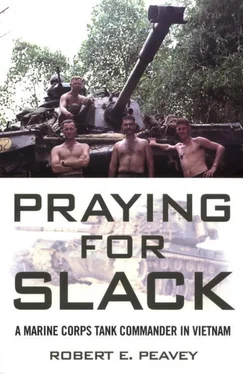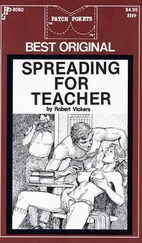Technically, Oceanview wasn’t a fire base at all, because it had no artillery there. But we had the largest guns in the world at our beck and call.
WHEN I FIRST ARRIVED I found this little outpost manned by a single Marine rifle platoon of only forty men. I worried what fate had in store for me. Oceanview’s other residents included a Navy officer, two Marine ANGLICO (Air-Naval Gunfire Liaison Company) people, and a very small detachment of Force Recon Marines.
Nobody associated with Recon, nor they with us. They even went as far as to rope off their small area with razor wire, thereby isolating themselves even more. These strange men would sneak into North Vietnam for weeks at a time. Often they wore ten-inch long, oblong wire hoops that hung off their belts, strung with what looked like dried prunes. I had no idea until someone clued me in that they were the ears of dead North Vietnamese soldiers.
Supporting this lightly held outpost were my two tanks and a pair of Army Dusters. These Doggie Dusters, as we called them, consisted of dual 40mm antiaircraft guns in an open mount, set on an M41 Walker Bulldog tank chassis.
The M42 Duster’s open mount provided little or no protection for the crew—a very undesirable feature in the minds of the tank crewsbut as defensive weapons, these little vehicles were worth their weight in gold, one of the factors contributing to our little outpost’s very survival. Every evening, just after sunset, the Dusters put on an awesome live-fire display, unleashing their exploding 40mm projectiles into the sand dunes to the west of us. That nightly act of defiance served to demotivate any would-be attackers outside the wire and was a morale booster for those within.
Intimidating as the Doggie Dusters and our tanks were, the real reason Oceanview wasn’t overrun sat offshore from us during the day, and just over the horizon at night. In fact, she was the reason Oceanview and its rickety wooden tower existed at all. During the bombing halt, she sailed down from North Vietnam to sit offshore from us and lobbed shell after shell into the southern half of the Z, the men in the rickety tower directing her gunfire. Oceanview served as the eyes of the world’s largest artillery piece on the world’s only active-duty battleship. No, it wasn’t the Dusters or our tanks that kept Mr. Charles away—it was the battle-ship USS New Jersey .
The Jersey was one of those things that can’t be described. The only word that comes to mind is “immense.” You had to see her, and you had to feel the truly awesome concussion from her guns and projectiles. Her giant guns dwarfed everything in Vietnam—or in the world for that matter. Each of her three huge turrets housed three 16-inch guns, each one able to hurl a 1,900-pound projectile 32,500 meters—or nineteen miles! At night, when she fired a salvo from over the horizon, the reddish glow briefly made it look like the sun was about to rise. We could hear the projectiles as they streaked overhead. Anyone looking carefully could trace their flight, like meteors shooting harmlessly across the night sky.
I was in awe of her size and power. On hot, sultry afternoons, when boredom reached its peak, I would aim our tank’s gun at the ship and peer through the gunner’s telescope, just to look at her magnificent lines. Thirty years later, I can still see the huge number “62” stenciled on her bow.
One day in late 1968, I received a radio message from my platoon leader, who was back in the safety of the hardened bunkers of C-4. Because I was the section leader and a tank commander, he called to warn me that my two tanks at Oceanview were about to take part in an Army operation that would take place in our tactical area of responsibility (TAOR).
I took that as good news. I hadn’t known the Army had any units this far north. But, if so, it was high time they did some of the fighting around here. That afternoon I was summoned to Oceanview’s little CP. Inside was the Marine infantry CO, a first lieutenant, with an Army major and several of the major’s staff. The Doggie officers all wore crossed sabers on their lapels, indicating that they were from an armored unit.
I was introduced as being from the Marine tanks. The major looked at me in disgust and said, “Corporal, go get your section leader.”
“Sir,” I said, “I am the section leader.”
Having worked with the Doggies before, I knew not to be insulted by the major’s remark. Army policy was that if you held the job, you deserved the rank. In the Army, a tank section leader would have been a staff sergeant at least; a mere corporal was only a lowly crewman. Holding a job and receiving the rank that went with it was the only thing I liked about the Army, for the Marine Corps didn’t recognize that policy at all.
The major was a little taken back by my response. Shaking his head in disbelief, he went on to review the operation slated for the following morning. Spread out in front of the officers was a map depicting our surrounding area. I listened as the major described how his armored unit would come up the beach at dawn, pass our position, and move into the DMZ. He then indicated on the map where they would begin to move inland across the sand dunes just north of Oceanview.
“Excuse me, sir,” I interrupted, “but you can’t take tanks in there.”
“Corporal,” he barked, “when I want your opinion, I’ll ask for it! Your job is to sit right where you are and cover our left flank from this outpost,” he said, pointing to Oceanview on the map. “You got that?”
Maybe he just didn’t realize, I thought. “Sir, you won’t get a hundred meters before hitting mines or old shells. That whole area is full of unexploded ordnance.”
“You just cover our flank, and leave the war to us!” he said, dressing me down in front of the others, then emphasizing my lowly rank. “If you’re through, corporal, may I finish the briefing?”
This smart ass thought he knew more about our TAOR than we did. We had been here for two months, but he knew the area better than us? Yeah, right! Screw you! I thought to myself.
“It’s your show, sir,” I said, answering his rhetorical question with a melodramatic headshake. Sarcasm always was one of my strongest and least-recognized talents.
After the meeting, I assembled my two crews and gave them the sitrep. I proceeded to unfold my own copy of the same map the major had just used. On it, I diagrammed exactly what I had just been briefed on.
“You gotta be shittin’ me!” said the other crew’s tank commander. “They’ll lose every tank they got!” All the other men shook their heads at the absurd idea of driving tanks over thousands of unexploded bombs and shells, plus countless antitank and antipersonnel mines.
“You know that, and I know that. This could well be the shortest operation we’ll ever see,” I told both crews, “and we won’t even have to leave Oceanview!”
“I hope they don’t find an unexploded round from the New Jersey ,” joked one of the crewmen.
“Hey,” said another, “if these guys want to clear the Z of mines and spent ordnance, all the better for us!”
I nodded sadly. “They really have no idea what they’re in for.”
We couldn’t wait for the next morning to arrive. The Army would be showing us how to fight the war on the DMZ, and we’d have ringside seats.
I HAD THE LAST WATCH THAT NIGHT. Well into the second hour, the first hint of light began to glow in the eastern sky. Another hour would bring another day, and the outpost would begin to stir.
As the sun began to show itself, I could hear the blowtorch-hiss of burning C-4. The men of Oceanview were heating up their morning coffee and cocoa. I was standing in the TC’s cupola, eating a can of beans and franks—the most sought-after meal in every case of C’s. I had just swallowed my second spoonful when I heard in the distance the faint but distinctive sound of tanks approaching up the beach from the south.
Читать дальше












